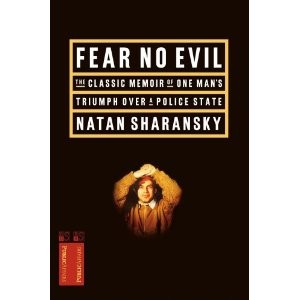Kosher Bookworm: Chanukah literature for inspiration and history
I begin this essay with the following little known episode that is truly a Chanukah themed saga. Rabbi Elchanan Samet of Yeshivat Har Etzion in his study on the Book of Psalms writes, “In Natan Sharansky’s book, “Fear No Evil” [Public Affairs, 1998], the book of Tehillim plays an important role in the account of the difficult years of his imprisonment until his release.”
Further on in the narrative Rabbi Samet relates the following incident just prior to Sharansky’s final release by his communist captors. “On the flight from Moscow that was to bring Sharansky to East Berlin, the person in charge of the flight appeared suddenly from behind a curtain and announced in a solemn voice: ‘Sharansky, Anatoly Borisovich. I am authorized to declare to you that by order of the Presidium of the Supreme Soviet of the USSR, for conduct unworthy of a Soviet citizen, you have been stripped of Soviet citizenship and as an American spy you are being expelled from the Soviet Union.’”
“Sharansky responded with a counter-declaration, in which he denied being an American spy. ‘I sat down with the sound of fanfare in my ears. I knew all along that this day had to come. And now I took the Psalm book and turned to Psalm 30, which I long ago decided to recite at the moment of my release. ‘A Song of David at the dedication of a house.’ It began. Now I was reading these words en route to my own house in Jerusalem!”
Rabbi Samet concludes by stating that, “At this point in the book, Psalm 30 appears, transcribed in short lines as a poem of thanksgiving, the psalm that Sharansky deemed most appropriate for this exalted moment.”
Elaborating on this point further in his commentary Rabbi Samet states that, “The fact that Psalm 30 is a thanksgiving psalm of an individual did not interfere with its adoption as a national psalm of thanksgiving [as part of the Chanukah observance] On the other hand the Hasmoneans may have found in our psalm unique expression of the speed of the rescue from the jaws of death, of the changing of mourning into gladness and dancing. Thus they may have viewed this psalm as fitting for the feeling of their sudden rise from political and religious servitude to national and religious emancipation.”
As a footnote, Rabbi Samet adds the following caveat, ”Similar consideration on the individual level brought Natan Sharansky to adopt this psalm as a thanksgiving psalm for his sudden liberation.”
It should be understood that the recitation of Psalm 30 at the end of the daily Chanukah services has become a universal practice. According to Ezras Torah Luach, this psalm is recited every Chanukah morning after services, and according to the “Luach Hashanah” of the Conservative tradition, in addition to the morning service, it is repeated at the conclusion of each evening service.
This liturgical tradition is further explained by numerous English language commentaries who detail both the theological and historical background of this tradition.
According to “The Bible / Psalms with The Jerusalem Commentary” [Mossad HaRav Kook, 2003] by Amos Hakham, the tradition has been to recite this psalm as the psalm of the day since the destruction of the Second Temple, as cited in tractate Soferim and Pesikta Rabbati.
Further, according to this source, “If we assume that this psalm was recited on Hanukkah in the Temple, it would stand to reason that the Hasmoneans said it on Hanukkah because they interpreted the dedication, ‘a song of dedication of the house,’ as an allusion to their own rededication of the Temple.”
Accordingly, as time went on, with the exception of Chabad, this evolved into its adoption, with variations, as the established liturgy during the entire festival.
Rabbi Avi Baumol, in his commentary, “The Poetry of Prayer”, [Gefen Publishing, 2009] notes the following:
“Originally there were certain traditions that included the recitation of Psalm 30 only during the eight days of the Chanukah festival. In fact, Rabbi Avraham Berliner, who discusses the late insertion of the psalm into the liturgy, writes that at first, starting with the Sephardic tradition, it became standard to Pesukei d’Zimra only on Chanukah……
“Berliner continues that the tradition of reciting it on Chanukah spread to other siddurim, but without the introduction informing people to recite the prayer only on Chanukah. As a result only in the last few hundred years has this psalm become standard for everyday prayers in all siddurim. While Berliner attributes this to faulty editing, perhaps there was another reason why this mizmor, at first regarded as a Chanukah mizmor, merited a place in the daily liturgy.”
Further on Rabbi Baumol notes that the theme of Psalm 30 is a natural to the themes of Chanukah. “It is therefore quite appropriate that Psalm 30 which illustrates the struggle in King David’s life, should be recited during Chanukah. At a time in history when there is a surge of effort to rededicate the physical house of G-d, we delve deeper, realizing that the true triumph was the rededication of the metaphorical houses guarding the people’s souls, Chanukah thus celebrates body and soul working in tandem to live a life of godliness and eternal praise of G-d.”

 66.0°,
Shallow Fog
66.0°,
Shallow Fog 




